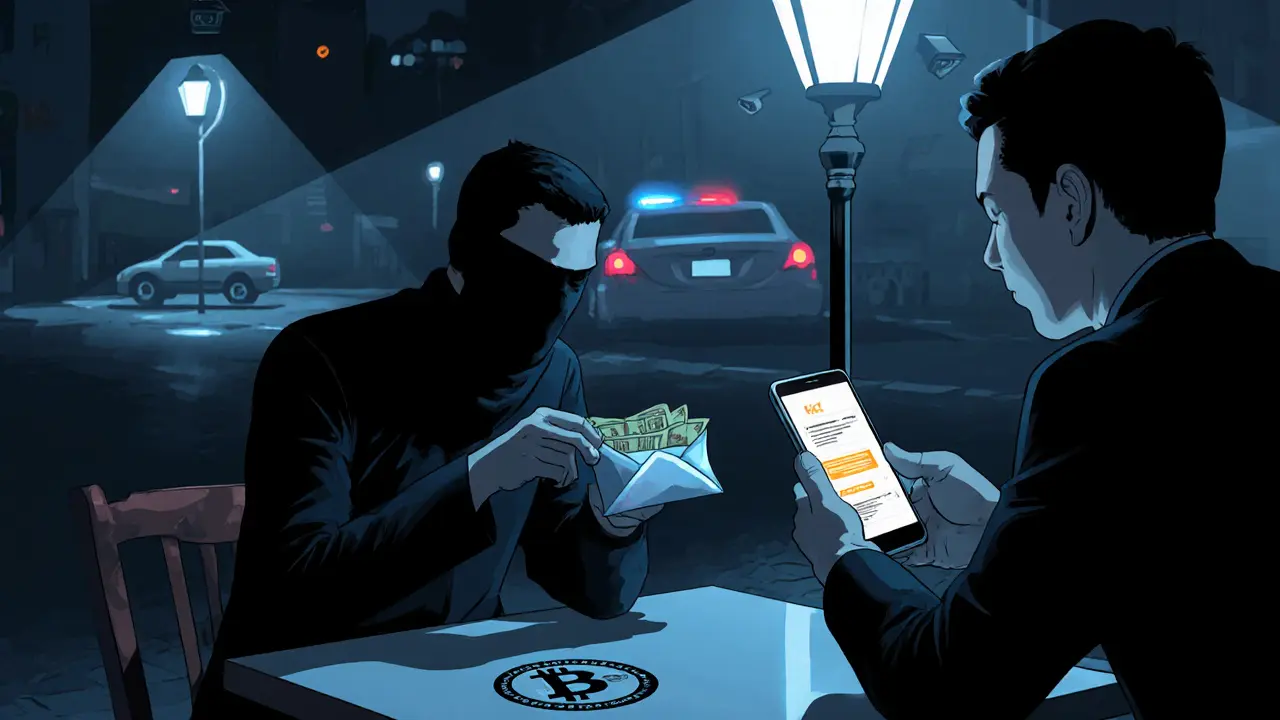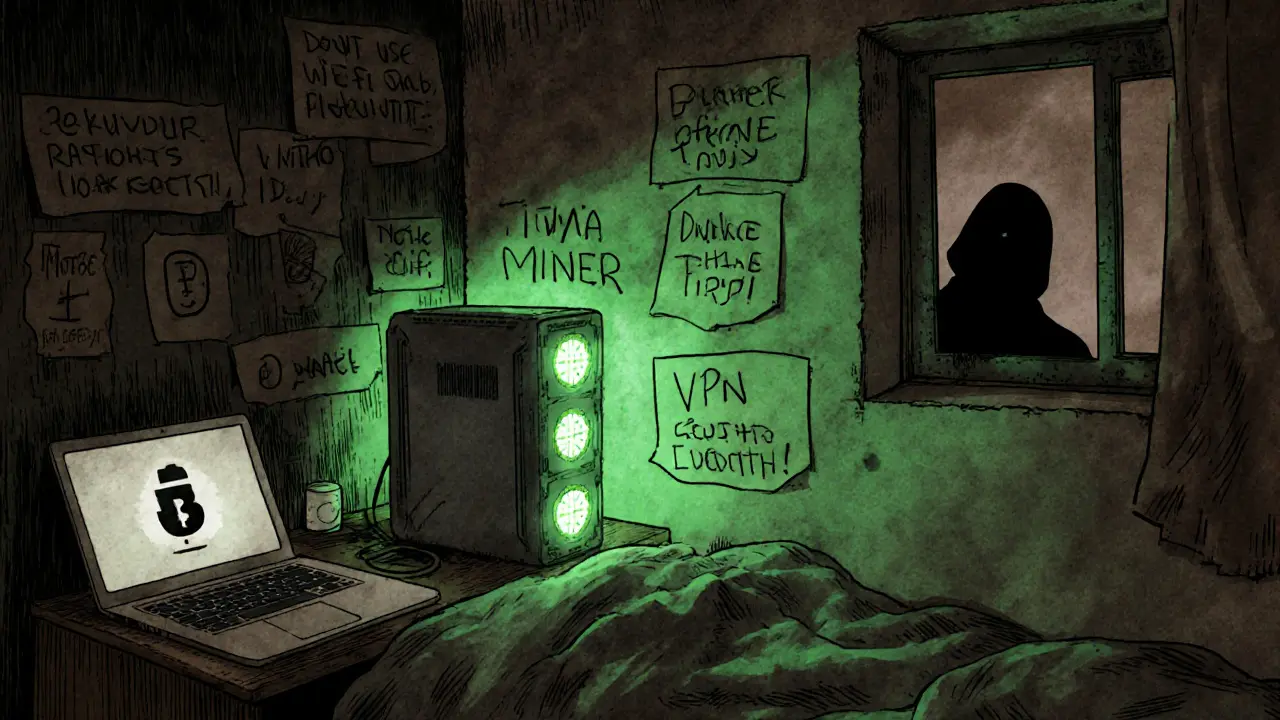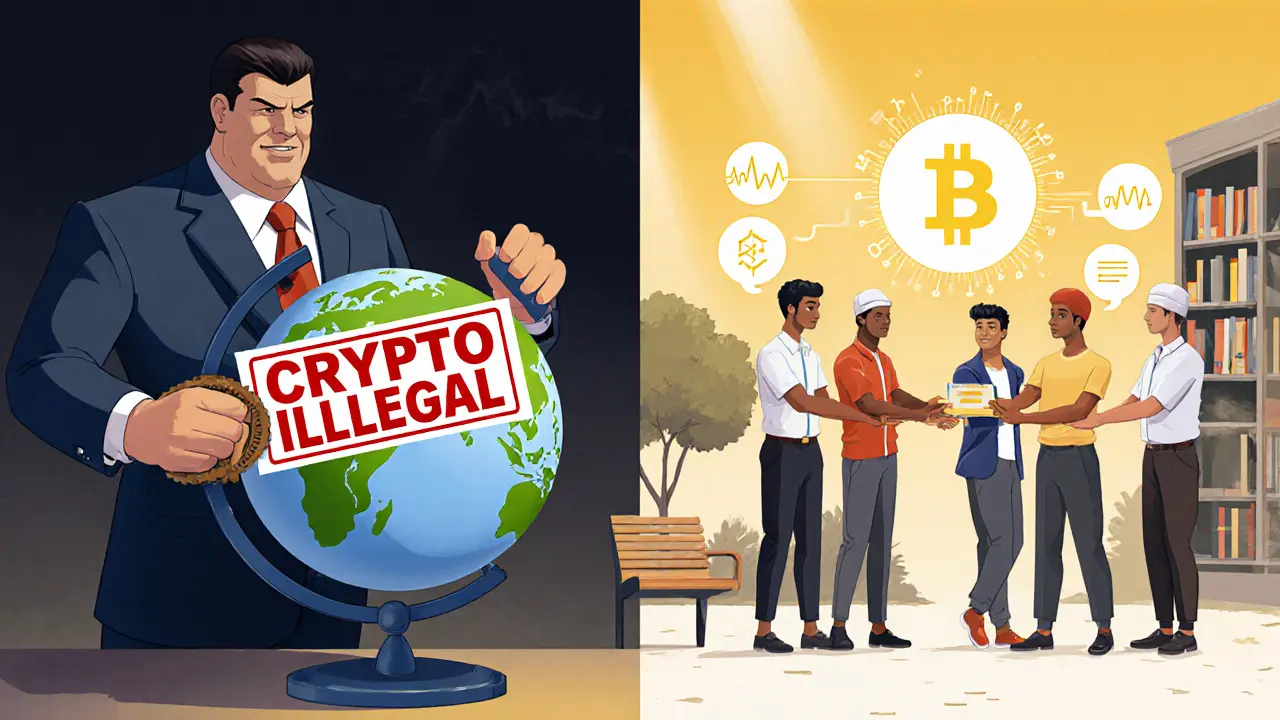
Algeria Crypto Risk Calculator
Algeria's 2025 ban criminalizes all cryptocurrency activities. This calculator shows the real-world risks and costs of using crypto in Algeria under Law No. 25-10.
Estimated Financial Cost:
Legal Consequences:
Alternative Options:
Algeria didn’t just restrict cryptocurrency in 2025-it outlawed it completely. On July 24, 2025, Law No. 25-10 went into effect, making it a crime to buy, sell, hold, trade, mine, or even promote any digital asset. The penalties? Up to a year in jail and fines of up to 2 million Algerian dinars-roughly $14,700. Repeat offenders face double the punishment. This wasn’t a warning. It was a full shutdown.
Before this law, Algeria had one of the biggest crypto markets in North Africa. Chainalysis reported in 2024 that Algerians were actively trading Bitcoin, Ethereum, and stablecoins through local P2P networks and international exchanges. People used crypto to send money abroad, protect savings from inflation, and bypass banking restrictions. But the government saw it as a threat to monetary control. So they pulled the plug-and forced the entire market underground.
What’s Actually Illegal Now?
The law doesn’t just ban exchanges. It criminalizes eight specific actions:
- Issuing new tokens or coins
- Purchasing or selling any cryptocurrency
- Using crypto as payment for goods or services
- Holding digital assets in any wallet
- Trading for speculation or profit
- Creating content that promotes crypto (even YouTube videos or Telegram posts)
- Operating or running a crypto exchange platform
- Mining Bitcoin or other cryptocurrencies
That last one is important. Mining used to be a quiet side hustle for tech-savvy Algerians with cheap electricity. Now, running a single ASIC miner in your bedroom could land you in prison. Even if you bought crypto before the ban and still have it in a wallet, you’re breaking the law.
How Is Crypto Still Moving?
Despite the risks, crypto hasn’t disappeared. It just went quiet.
People are still trading-but only through hidden channels. Peer-to-peer deals happen over encrypted apps like Signal or Telegram. Traders meet in person in public places like cafes or parks, cash in hand, no receipts, no trace. Some use international platforms like Binance or Kraken, but only through VPNs that mask their location. Others turn to stablecoins like USDT or USDC, which hold value tied to the U.S. dollar. These are easier to move across borders and less volatile than Bitcoin, making them the preferred tool for preserving wealth.
There’s no official data on how many people are still using crypto. But given that over 2 million Algerians were estimated to own digital assets in 2024, it’s safe to assume tens of thousands are still active-just deeply hidden.
The Hidden Costs of Going Underground
Using crypto in Algeria now isn’t like using it in the U.S. or Nigeria. It’s riskier, slower, and more expensive.
- Higher prices: Because supply is limited and trust is low, buyers pay up to 15-25% more than global market rates to get their crypto. Sellers demand cash upfront and refuse to deal with strangers.
- No protection: If you get scammed, there’s no chargeback. No recourse. No police help. You lose everything.
- Slower transactions: No instant transfers. Every trade requires coordination, verification, and timing to avoid surveillance.
- Security nightmares: Users must use burner phones, encrypted wallets, and never reuse addresses. One misstep-like logging into a crypto site from your home Wi-Fi-could lead to a raid.
Many who used crypto before the ban have quit. But those who still need it-like families sending remittances to relatives abroad, or small business owners dealing with hyperinflation-are taking the risk.

Who’s Still in the Game?
The underground market isn’t for beginners. It’s for people who know what they’re doing-or have no other choice.
Most participants fall into three groups:
- Remittance senders: Algerians working in Europe or Canada use crypto to send money home faster and cheaper than Western Union. Banks block transfers, so crypto is the only option left.
- Small traders and importers: Businesses that buy goods from Turkey or China often get paid in crypto because local banks refuse to process their invoices. They convert crypto to cash through underground networks.
- Technical users: Engineers, developers, and students who understand blockchain and privacy tools. They’re the ones building the networks, running nodes, and keeping the system alive.
There’s no middle class here anymore. If you don’t have the tech skills or the nerve, you’ve already dropped out.
What Happens If You Get Caught?
The government hasn’t made many public arrests-but that doesn’t mean they’re not watching.
Algerian authorities have access to bank transaction logs, telecom data, and internet traffic. They can track IP addresses linked to crypto exchanges. If you use a local ISP and connect to a crypto platform, even through a VPN, your digital footprint might still leave traces.
One user in Oran told a friend (who later deleted the message) that his neighbor was raided in August 2025. Police seized laptops, phones, and a small mining rig. He was fined 800,000 dinars ($6,000) and given a suspended sentence. He lost his job. His name is now flagged in government databases.
That’s the real fear-not prison, but a permanent black mark. A criminal record that blocks you from government jobs, university admissions, or even international travel.

Why Won’t the Ban Work?
Algeria isn’t the first country to ban crypto. China did it in 2021. India tried heavy restrictions. Egypt and Nigeria cracked down hard. In every case, crypto didn’t vanish-it adapted.
When you ban something people need, they find a way. In Algeria, that need is simple: protection from inflation, access to global markets, and financial freedom. The state can shut down exchanges. It can’t shut down the internet. It can’t stop people from holding keys to their own wallets.
Experts like Amir Haddadi, a fintech analyst based in Tunis, say the ban is a political move-not an economic one. "They’re not trying to stop crypto," he says. "They’re trying to send a message: the state controls money. No exceptions."
But that message doesn’t work for everyone. Young Algerians are still learning about blockchain. They’re still downloading wallets. They’re still asking questions in private groups. The knowledge isn’t gone. It’s just buried.
The Future: Will It Ever Be Legal Again?
Right now, the government shows no signs of backing down. The ban is tied to broader efforts to control the economy, reduce foreign currency outflows, and maintain the central bank’s monopoly on money.
But pressure is building. The Algerian dinar has lost 30% of its value against the dollar since 2022. Inflation is above 10%. Young people are leaving the country in droves. Meanwhile, neighboring countries like Morocco and Tunisia are quietly building crypto-friendly regulations to attract tech investment.
If Algeria’s economy keeps struggling, the underground crypto market will grow-not shrink. More people will need it. More businesses will rely on it. And eventually, enforcement will become too costly, too inconsistent, too impossible.
The state might win the battle. But the war? That’s still being fought-in encrypted chats, in cash trades under streetlights, in wallets no one can see.
What This Means for the Rest of the World
Algeria’s case is a warning. When governments try to erase digital money instead of regulating it, they don’t stop innovation-they push it into the dark.
It creates a two-tier system: those who can afford the risk, and those who can’t. It drives out honest users and empowers criminals. It makes financial crime harder to track, not easier.
And it doesn’t protect citizens. It just leaves them more vulnerable.
Algeria’s underground crypto market isn’t a failure of technology. It’s a failure of policy. The law says crypto is illegal. But the people? They’re still using it. And they’re not going to stop.
Is it illegal to own Bitcoin in Algeria?
Yes. Under Law No. 25-10, enacted in July 2025, holding any cryptocurrency-even if you bought it before the ban-is a criminal offense. Authorities can seize wallets, devices, and funds. Penalties include fines up to 2 million Algerian dinars and up to one year in prison.
Can I use crypto to send money to family in Algeria?
Technically, no-it’s illegal. But many Algerians abroad still do it through underground P2P networks. Senders convert crypto to cash via trusted contacts inside Algeria. Recipients receive physical dinars. This method avoids banks and government tracking, but carries high risk and fees. There is no legal protection if something goes wrong.
Are stablecoins like USDT legal in Algeria?
No. Stablecoins are treated the same as Bitcoin or Ethereum under Algerian law. Any digital asset not issued by the central bank is banned-including USDT, USDC, and DAI. Using them to store value or make payments is considered a violation of Law No. 25-10.
Can I mine cryptocurrency in Algeria?
Mining is explicitly banned under Article 6 bis of Law No. 25-10. Running mining hardware-even on a small scale-is a criminal offense. Authorities have conducted raids on homes with mining rigs, seizing equipment and issuing fines. Electricity usage patterns can also trigger investigations.
What happens if I post about crypto on social media in Algeria?
Posting about cryptocurrency-even educational content-is classified as "promoting illegal activity" under the law. This includes YouTube videos, Telegram channels, Twitter threads, or Facebook groups. Authorities monitor social media for keywords related to crypto. Users have been summoned for questioning, and some accounts have been shut down.
Is there any way to legally use crypto in Algeria?
No. There are no legal exemptions, licenses, or exceptions under the current law. All forms of cryptocurrency activity-personal, commercial, or technical-are prohibited. Even using crypto as a store of value or for academic research is illegal. The only legal option is to avoid crypto entirely.


Comments
Prateek Kumar Mondal
Crypto is still alive in Algeria and no law can kill what people need
William P. Barrett
This isn't about money. It's about control. The state sees crypto as a threat because it gives people autonomy. When you ban something that empowers the individual, you're not protecting the economy-you're protecting your own power. History repeats: firewalls, censorship, bans-they all fail because humans adapt. The real question isn't whether crypto will survive in Algeria-it's whether the government will survive its own paranoia.
Jasmine Neo
Algeria’s just being smart. Let people gamble with digital fantasy money and then cry when they lose everything. This is why developing nations shouldn’t be allowed to have decentralized systems. It’s chaos wrapped in blockchain buzzwords. The dinar’s weak? Fix your economy. Don’t outsource your currency to anonymous devs in Singapore. This is a public health crisis disguised as financial freedom.
Ron Murphy
Interesting how the enforcement is uneven. You can’t mine a rig in your bedroom, but the same authorities turn a blind eye to offshore dollar accounts held by elites. There’s hypocrisy baked into this ban. It’s not about monetary stability-it’s about who gets to play. The underground market exists because the formal system failed the people. Crypto isn’t the problem. The state’s monopoly is.
Cory Munoz
I can’t imagine living in a place where your savings are illegal. I’ve seen friends in Venezuela go through this-same fear, same tricks, same quiet desperation. It’s not about tech. It’s about dignity. People aren’t using crypto because it’s cool. They’re using it because their government took away their right to protect what’s theirs. I hope someone in power reads this and realizes: you can’t legislate away human need.
Jean Manel
Let’s be real-this is just another authoritarian move disguised as fiscal policy. The government doesn’t care about inflation. They care about control. And now they’ve criminalized financial literacy. Anyone with a brain and a phone is already laughing at this law. The fact that they’re raiding home miners? That’s not enforcement. That’s performance theater for the IMF.
Clarice Coelho Marlière Arruda
so like… if i buy btc before july 2025 and just… keep it in a wallet… still illegal?? like even if i never touch it again??
Brian Collett
Yup. The law says holding is illegal. No exceptions. Even if you bought it legally before the ban, now it’s contraband. That’s the real kicker-retroactive criminalization. You didn’t break the law… until they changed the law to make you guilty.
Allison Andrews
This reminds me of Prohibition. You outlaw something people want, and you don’t stop the behavior-you just make it more dangerous. The black market thrives. The vulnerable get hurt. The powerful stay safe. And the state gets to feel righteous while everyone else pays the price. The Algerian government isn’t stopping crypto. They’re just moving it into the shadows where it’s harder to regulate, harder to tax, and easier to exploit.
Wayne Overton
they’re gonna jail people for having a wallet
Alisa Rosner
OMG this is so sad 😔 People are just trying to survive! Imagine being scared to even open a crypto app because the police might show up at your door. This isn’t economics-it’s fear. And fear doesn’t build a future. It just breaks people. Please, if you’re reading this, don’t forget about them. 🙏
MICHELLE SANTOYO
Wait wait wait-so you’re saying the government is the real criminal? That they’re the ones stealing people’s freedom? But what about the bankers? What about the global elite? Who’s really pulling the strings here? Are we just supposed to accept this narrative? I’m not buying it. This is all a distraction. The real story is the IMF pushing this. Crypto is just the scapegoat. Wake up people. The system is rigged and they want you to fight each other over wallets while they steal everything else.
Nick Cooney
so… if i send my aunt 500 usdt via signal and she cashes out with a guy in a park… am i a terrorist? or just a good nephew? 😏